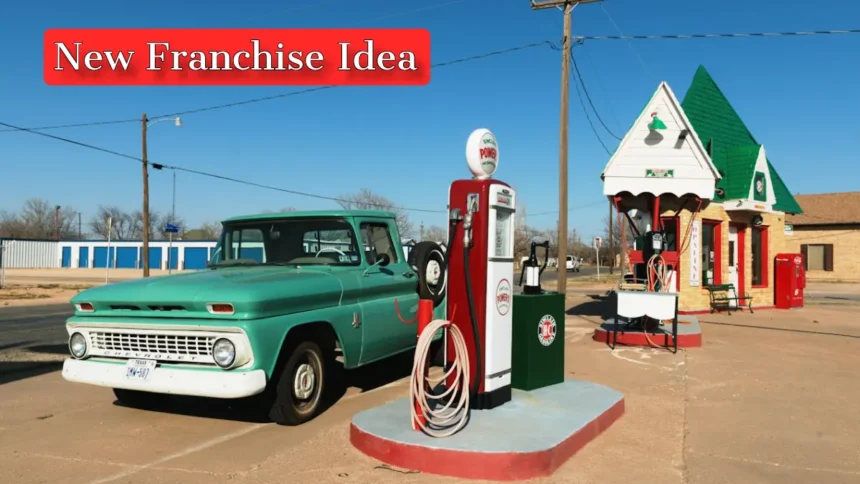When considering a gas station franchise, potential franchisees often ask a key question: How much does it cost to open a gas station franchise? This is a significant investment, and understanding the financial requirements, ongoing costs, and potential profits is crucial to making an informed decision.
In this article, we will explore the costs associated with gas station franchises in detail, alongside other critical factors that should influence your decision.
Understanding the Initial Costs of a Gas Station Franchise
The initial investment for a gas station franchise can vary significantly depending on several factors. Including the location, the brand, and whether the station is being built from scratch or purchased as an existing location.
Franchise Fee
One of the first expenses to consider is the franchise fee. This is a one-time fee that gives you the right to operate under the brand name of a particular oil company or gas station chain. Franchise fees can range from $20,000 to $50,000 or more, depending on the brand.
Real Estate Costs
Real estate is another significant factor in the initial investment. The cost of land and construction can vary greatly depending on the location. If you’re looking to buy land and build a new station, the cost can range from $300,000 to $1,000,000 or more. Alternatively, purchasing an existing station might be less expensive, with costs ranging from $100,000 to $300,000 for the property alone.
Construction and Equipment Costs
Building a gas station from the ground up involves several construction and equipment costs. This includes building the station structure, installing fuel tanks and pumps, setting up a convenience store, and more. These costs can add up quickly, with a total investment ranging from $250,000 to $1,500,000 depending on the size and complexity of the station.
Licensing and Permits
Acquiring the necessary licenses and permits is another critical step. These can include environmental permits, business licenses, and health permits for any convenience store operations. The cost for these can range from $10,000 to $50,000 or more, depending on local regulations and requirements.
Ongoing Costs of Running a Gas Station Franchise
Once your gas station is up and running, there are several ongoing costs to consider. These costs are crucial for the daily operation of the business and must be factored into your financial planning.
Fuel Costs
The primary expense in running a gas station is the cost of purchasing fuel. Gas stations typically operate on thin margins for fuel sales, so it’s essential to understand how fuel pricing works. The cost of fuel will depend on wholesale prices, which can fluctuate based on market conditions. Most gas stations have agreements with their franchisor for fuel supply, which can affect both cost and pricing.

Staffing Costs
Staffing is another significant ongoing expense. Depending on the size of your station, you may need several employees to manage the pumps, the convenience store, and administrative tasks. The wages for these employees can range from $20,000 to $50,000 per year per employee, depending on the location and the level of experience required.
Maintenance and Repairs
Gas stations require regular maintenance to ensure that all equipment, including fuel pumps and storage tanks, operates safely and efficiently. Routine maintenance costs can range from $10,000 to $20,000 per year, with occasional major repairs potentially costing much more.
Insurance Costs
Given the nature of the business, insurance is a critical ongoing cost for a gas station franchise. This can include general liability insurance, property insurance, and workers’ compensation insurance. Depending on the location and size of the station, insurance costs can range from $5,000 to $15,000 annually.
Potential Profits and ROI
While the costs of opening and operating a gas station franchise are substantial, the potential for profit is significant as well. Profit margins for gas stations can vary widely, but on average, stations can earn a net profit of $40,000 to $100,000 per year. This profit is influenced by factors such as location, competition, and the efficiency of operations.
Factors Affecting Profitability
Several factors can affect the profitability of a gas station franchise:
- Location: Stations in high-traffic areas or near highways typically see higher sales volumes, leading to greater profits.
- Additional Services: Offering additional services like car washes, convenience stores, and food service can significantly boost revenue.
- Operational Efficiency: Managing costs effectively, including fuel pricing, staffing, and maintenance, is crucial to maximizing profitability.
Return on Investment (ROI)
The ROI on a gas station franchise can be attractive, but it requires careful management and a keen understanding of the industry. Typically, franchisees can expect to see a return on their initial investment within 3 to 7 years, depending on the location and market conditions.
Advantages of Owning a Gas Station Franchise
Owning a gas station franchise comes with several advantages:
- Brand Recognition: Operating under a well-known brand can attract customers and provide a competitive edge in the market.
- Support from Franchisors: Many franchisors offer support in terms of marketing, training, and operations, which can be invaluable for first-time business owners.
- Steady Demand: Fuel is a necessity, and gas stations often enjoy steady demand, even during economic downturns.

Challenges to Consider
Despite the advantages, there are also challenges to owning a gas station franchise:
- High Initial Investment: The upfront costs can be prohibitive for many potential franchisees.
- Thin Margins: Fuel sales typically offer low margins, meaning that high volume is necessary for profitability.
- Regulatory Compliance: The gas station industry is heavily regulated, requiring constant attention to compliance with environmental and safety standards.
Conclusion
Investing in a gas station franchise can be a lucrative business venture, but it requires significant capital, careful planning, and diligent management. Understanding the full scope of costs, potential profits, and the advantages and challenges of the business is essential for success.
Related: Here is How to Start an Airbnb without Owning Property
QNAs
1. How much does it cost to open a gas station franchise?
Answer: The cost to open a gas station franchise typically ranges from $250,000 to $2 million, depending on factors like location, brand, and whether you’re building a new station or purchasing an existing one.
2. Is owning a gas station profitable?
Answer: Yes, owning a gas station can be profitable, with average annual profits ranging from $40,000 to $100,000. Profitability depends on factors like location, operational efficiency, and additional services offered.
3. What are the ongoing costs of running a gas station?
Answer: Ongoing costs include fuel purchases, staffing, maintenance, insurance, and utilities. These costs vary but can total several hundred thousand dollars annually.
4. What are the advantages of owning a gas station franchise?
Answer: Advantages include brand recognition, steady demand for fuel, franchisor support, and the potential for additional revenue streams like convenience stores and car washes.
5. How long does it take to see a return on investment (ROI) from a gas station franchise?
Answer: The ROI for a gas station franchise typically occurs within 3 to 7 years, depending on the location, market conditions, and effective management of the business.
Related: 9 Manufacturing Business Ideas with Medium Investment




